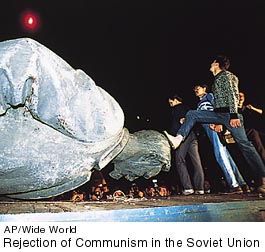
4. The Russian Revolution (1917)
In the midst of World War
I, Russia initiated the experiment in Communism on a national scale
that only recently ended in some parts of the world, faded in others,
and sustained itself in variant forms in a remnant of nations. For writers
and political philosophers, Communism represented many things during
the century. Conceptions ranged from the great salvation of material
economies to the great suppression of individual desires and capacities.
Until its virtual demise in the Soviet Union and Eastern Europe at century's
end, Communism sustained a vast literature of hope and an equally vast
literature of doom.

|

Michael Seidel
is a Professor in the
Department of English and Comparative Literature at Columbia University. His Top
10 list reflects a broad historical approach. He also discusses the impact of
the great events on writers, artists, and humanity in general.
|


